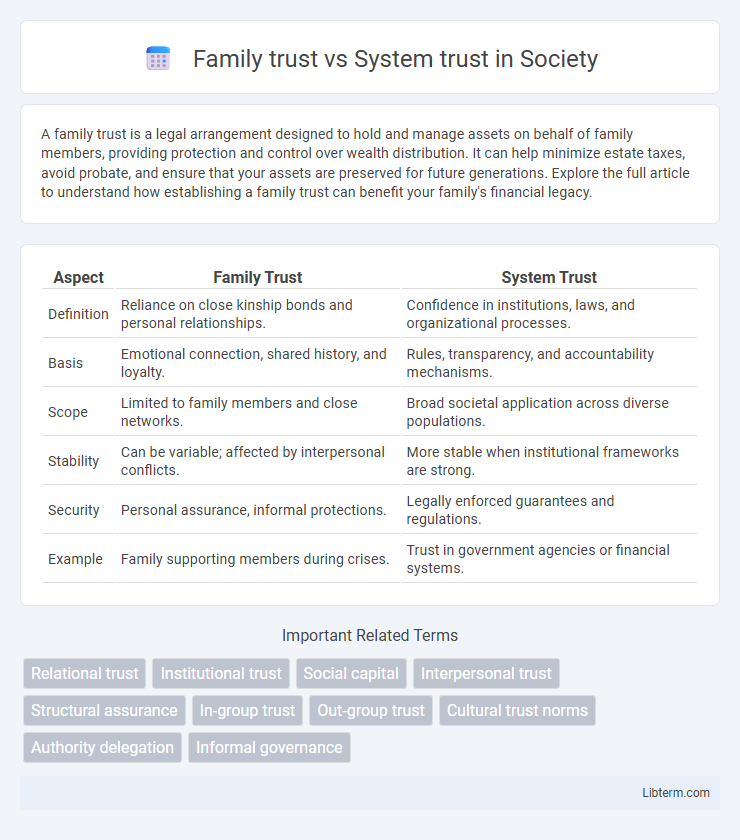A family trust is a legal arrangement designed to hold and manage assets on behalf of family members, providing protection and control over wealth distribution. It can help minimize estate taxes, avoid probate, and ensure that your assets are preserved for future generations. Explore the full article to understand how establishing a family trust can benefit your family's financial legacy.
Table of Comparison
| Aspect | Family Trust | System Trust |
|---|---|---|
| Definition | Reliance on close kinship bonds and personal relationships. | Confidence in institutions, laws, and organizational processes. |
| Basis | Emotional connection, shared history, and loyalty. | Rules, transparency, and accountability mechanisms. |
| Scope | Limited to family members and close networks. | Broad societal application across diverse populations. |
| Stability | Can be variable; affected by interpersonal conflicts. | More stable when institutional frameworks are strong. |
| Security | Personal assurance, informal protections. | Legally enforced guarantees and regulations. |
| Example | Family supporting members during crises. | Trust in government agencies or financial systems. |
Understanding Family Trust: Definition and Key Features
Family trust is a legal arrangement where assets are held and managed by trustees for the benefit of family members, ensuring wealth preservation and succession planning. Key features include control over asset distribution, protection from creditors, and potential tax advantages. Unlike system trust, family trust emphasizes personalized management tailored to the family's specific financial goals and long-term legacy.
System Trust: Meaning and Core Principles
System trust refers to the confidence individuals place in institutions, organizations, and social systems based on their perceived reliability, fairness, and effectiveness. Core principles of system trust include transparency, accountability, consistency, and adherence to established rules and norms, which foster predictability and reduce uncertainty in social interactions. Unlike family trust, which relies on personal relationships and emotional bonds, system trust depends on structural mechanisms and formal processes to maintain legitimacy and social order.
Differences Between Family Trust and System Trust
Family trust relies on personal relationships and shared values within a close-knit group, fostering loyalty and cooperation based on emotional bonds. System trust depends on established rules, institutions, and formal mechanisms that regulate interactions and ensure predictability in large, impersonal settings. The key difference lies in family trust being relational and informal, while system trust is structural and formalized through legal or institutional frameworks.
Pros and Cons of Family Trust
Family trusts offer significant benefits such as asset protection, estate planning flexibility, and potential tax advantages by transferring wealth across generations without probate. However, they can be complex to establish and maintain, often requiring professional legal and financial advice, with possible limitations on control and distributions depending on trust terms. Compared to system trust, which relies on networked consensus, family trusts centralize control within the trustee(s), potentially risking conflicts among beneficiaries or governance challenges.
Advantages and Limitations of System Trust
System trust offers scalability and consistency by relying on formal protocols, algorithms, and institutional frameworks that remove reliance on personal relationships. This structured approach ensures predictable outcomes and can handle large-scale interactions across diverse participants. However, system trust may face limitations such as vulnerability to technical failures, lack of personal accountability, and challenges in adapting to unique or unforeseen situations.
Impact of Culture on Trust Dynamics
Family trust often thrives on shared cultural values, traditions, and long-term relational bonds that reinforce loyalty and emotional commitment, creating a cohesive trust dynamic rooted in personal identity. System trust depends on formal institutions, rules, and processes that require cultural acceptance of authority, predictability, and transparency, influencing the collective confidence in organizational or societal frameworks. Variations in cultural dimensions such as individualism versus collectivism significantly shape how trust is allocated between family-based networks and impersonal systems, affecting communication patterns, decision-making, and risk tolerance.
Role of Trust in Social Institutions
Family trust serves as the foundational social capital that fosters cooperation, emotional support, and intergenerational stability within close-knit groups, reinforcing social cohesion at the micro level. System trust pertains to the confidence individuals place in formal institutions, such as government, legal systems, and financial organizations, which is essential for maintaining public order, compliance with laws, and the effective functioning of complex societies. High levels of both family trust and system trust contribute to resilient social institutions by enabling predictable interactions and reducing transaction costs in social and economic exchanges.
Building and Maintaining Family Trust
Building and maintaining family trust requires consistent communication, transparency, and reliability to foster emotional security and strong relationships. Family members must demonstrate empathy and accountability, addressing conflicts openly to reinforce trust bonds over time. Prioritizing shared values and mutual respect strengthens trust, creating a resilient foundation that supports family unity and well-being.
Frameworks for Strengthening System Trust
Frameworks for strengthening system trust emphasize transparency, accountability, and consistent performance across institutions, leveraging mechanisms such as third-party audits, governance protocols, and data privacy safeguards. Unlike family trust, which is built on personal relationships and emotional bonds, system trust depends on reliable processes and institutional integrity. Implementing clear regulatory frameworks and fostering open communication channels enhances users' confidence in complex systems and organizations.
Balancing Family and System Trust in Modern Society
Balancing family trust and system trust is essential in modern society to ensure social cohesion and effective governance. Family trust, built on personal relationships and shared experiences, fosters emotional support and community resilience, while system trust relies on confidence in institutions, laws, and procedural fairness to maintain order and public cooperation. Integrating both forms of trust enables individuals to navigate complex social environments, combining the stability of close-knit networks with the reliability of formal systems.
Family trust Infographic

 libterm.com
libterm.com